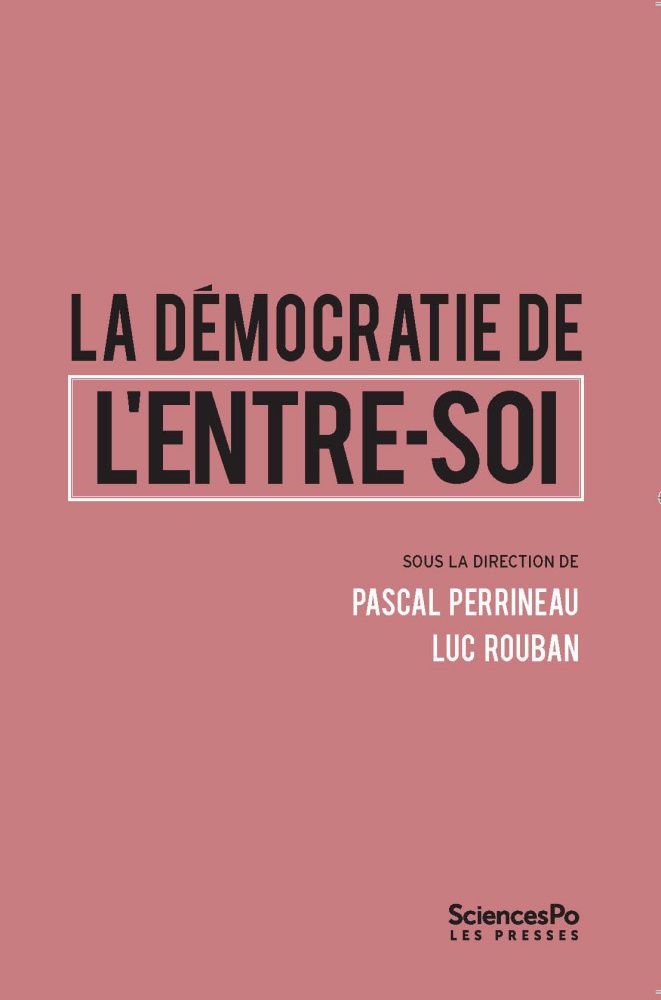La démocratie de l'entre-soi
Première édition
Fracture entre le peuple et les élites, inégalités sociales et sexuées, faiblesses de la démocratie participative, rejet du projet européen au profit du nationalisme, primauté de l'intime dans la construction de l'engagement politique et du lien citoyen, incertitudes du socialisme et du libéralisme de demain…
Que nous disent ces signaux sur l'évolution de la démocratie en France se demande ici une équipe de chercheurs du CEVIPOF ?
Que le « commun » ne se fabrique plus à partir du public mais du privé. Que le politique a désormais pour creusets des espaces communautaires de toutes sortes, famille, obédiences religieuses, partis politiques, oligarchies… Qu’à cette confusion des répertoires répond une fragmentation sociale assumée, malgré les célébrations républicaines et les appels à l’union nationale.
Ainsi s’élabore une démocratie de l’entre-soi, en rupture avec le principe de séparation des espaces public et privé qui a fondé la vie démocratique depuis les révolutions américaine et française.
Spécifications
- Éditeur
- Presses de Sciences Po
- Auteur
- Pascal Perrineau, Luc Rouban,
- Avec
- Alexandre Escudier, Martial Foucault, Lucien Jaume, Janine Mossuz-Lavau, Anne Muxel, Janie Pélabay, Henri Rey, Réjane Sénac, Virginie Tournay, Thierry Vedel,
- Collection
- Académique
- Langue
- français
- Catégorie (éditeur)
- Internet Hierarchy > Politique
- BISAC Subject Heading
- POL000000 POLITICAL SCIENCE
- BIC subject category (UK)
- JP Politics & government
- Code publique Onix
- 06 Professionnel et académique
- CLIL (Version 2013-2019 )
- 3283 SCIENCES POLITIQUES
- Date de première publication du titre
- 16 mars 2017
- ONIX Adult Audience Rating
- Avertissement de contenu
- Type d'ouvrage
- Monographie
- Avec
- Index, Bibliographie
ePub
- Date de publication
- 16 mars 2017
- ISBN-13
- 9782724620528
- Contenu du produit
- Text (eye-readable)
- Ampleur
- Nombre de pages de contenu principal : 224
- Code interne
- 9782724620528
- Protection technique e-livre
- DRM -Adobe
- Prix
- 12,99 €
- ONIX XML
- Version 2.1, Version 3
Livre broché
- Date de publication
- 16 mars 2017
- ISBN-13
- 978-27246-2050-4
- Contenu du produit
- Text (eye-readable)
- Ampleur
- Nombre de pages de contenu principal : 218
- Code interne
- 9782724620504
- Format
- 13,8 x 21 x 1,5 cm
- Prix
- 17,00 €
- ONIX XML
- Version 2.1, Version 3
Google Livres Aperçu
Sommaire
Introduction
Chapitre 1 – « Oligarchie » : l'ombre portée de la démocratie ?
Alexandre Escudier
Chapitre 2 – De l'oligarchie à la classe dirigeante ou comment ne pas se tromper de débat
Luc Rouban
Chapitre 3 – La France politique des possédants et des non-possédants
Martial Foucault
Chapitre 4 – L’expertise a‑t‑elle besoin de représentation politique ?
Virginie Tournay
Chapitre 5 – L’internet et la démocratie : une liaison difficile
Thierry Vedel
Chapitre 6 – De la démocratie sans les femmes à une démocratie dégenrée qui dérange
Janine Mossuz-Lavau, Réjane Sénac
Chapitre 7 – L’expérience démocratique au prisme de l’intime
Anne Muxel
Chapitre 8 – La République des « valeurs » : entre public et privé, quel lien citoyen ?
Janie Pélabay
Chapitre 9 – Front national : un nouveau vote de classe ?
Pascal Perrineau
Chapitre 10 – Nation-solution ou nation-problème ?
Nation, nationalisme et antinationalisme en France
Gil Delannoi
Chapitre 11 – La remise en cause de l’Europe
Bruno Cautrès
Chapitre 12 – L’identité (perdue ?) de la gauche
Henri Rey
Chapitre 13 – Le libéralisme difficile : un tournant historique ?
Lucien Jaume
Conclusion
Pascal Perrineau, Luc Rouban

